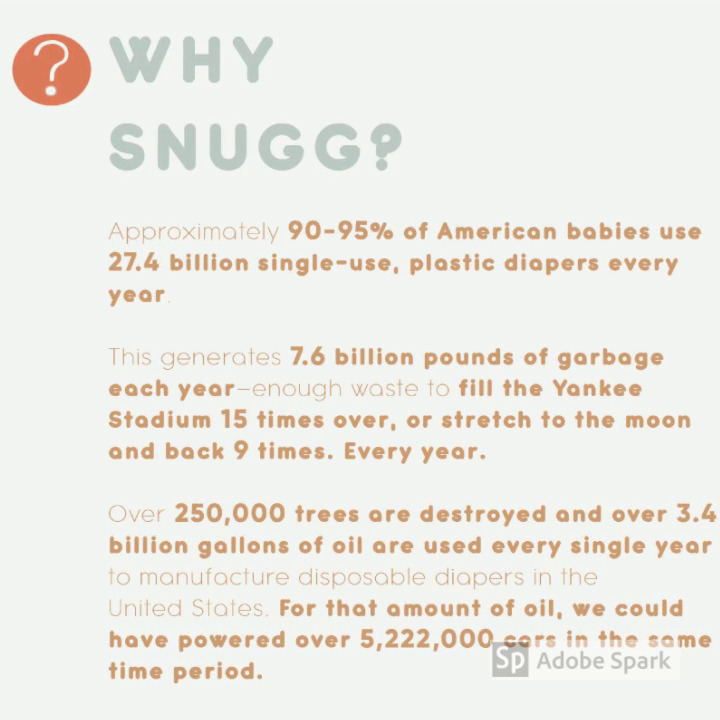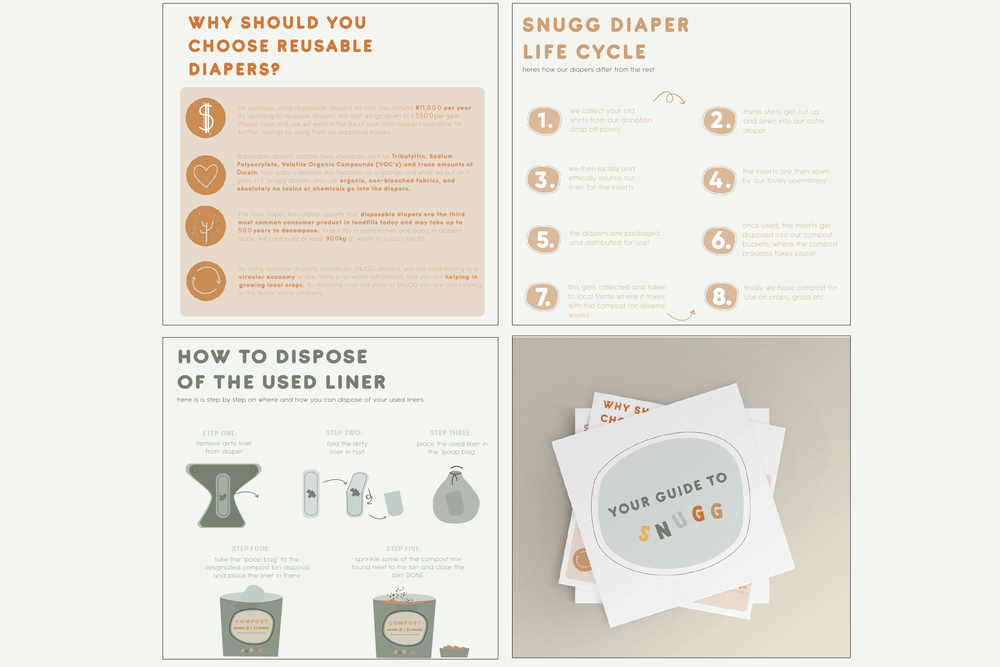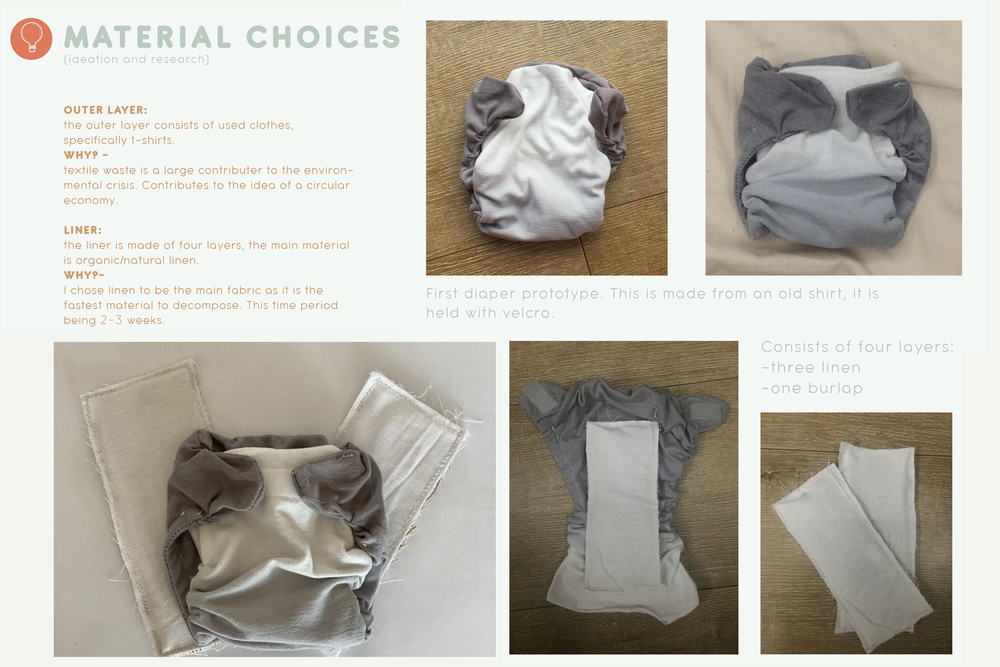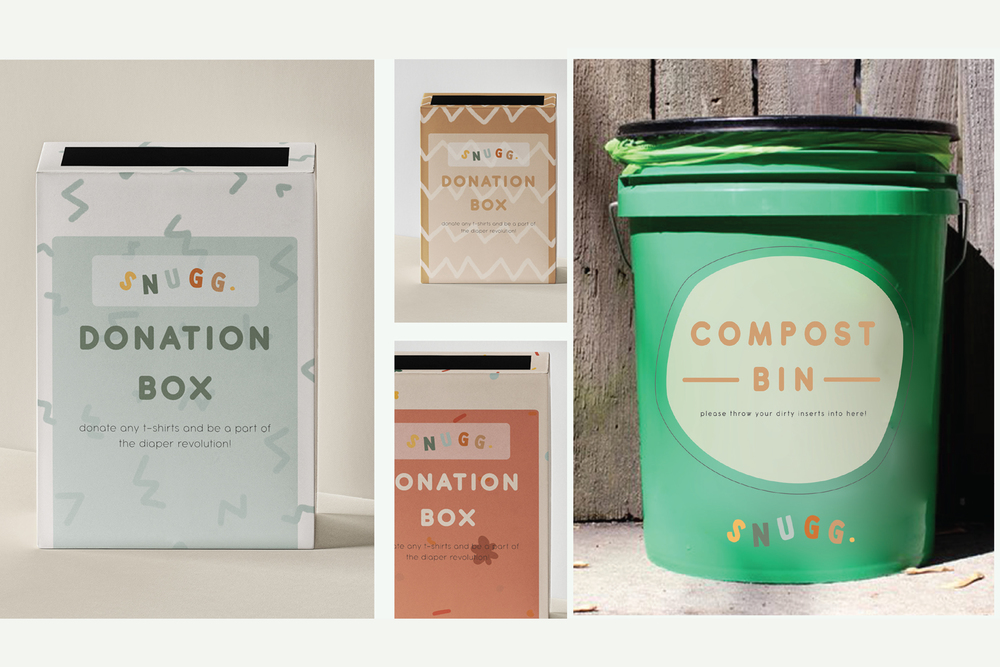Honorable Mention
Snugg Reusable Diapers With
Bio-Degradeable Liners
A fully recycled reusable diaper, with a biodegradable liner, that is composted to support farmers
Solution
The Snugg sustainable, reusable diaper can be easily disposed of, and doesn’t require a flushing toilet or washing machine. The outer reusable layer consists of recycled cotton t-shirts, as textile waste is a large contributor to the environmental crisis. The liner is made of four layers and the main material is natural linen, as it is the fastest fabric to decompose, within 2-3 weeks. The inner liner is disposed in a compost bin, and collected weekly. The compost is sold to fund the project.
Project Description
Although there are currently many reusable diaper brands; they are expensive, require a home with a washing machine and a flushing toilet, and are still detrimental to the planet.
The Snugg sustainable, reusable diaper can be easily and ecologically disposed of. The outer reusable layer consists of recycled cotton t-shirts, as textile waste is a large contributor to the environmental crisis. The liner is made of four layers, mainly natural linen as it is the fastest fabric to decompose, within 2-3 weeks. The inner liner is disposed in a compost bin, and collected weekly by a composting company.
The Snugg compost bin will be collected and replaced weekly by a local composting facility. This compost, in turn, will be sold to local urban farmers at a discounted rate. All proceeds will go towards the production of Snugg Diaper kits. This ‘kit’ is available for a small fee at local hospitals.
Overview of the Solution
Problem: The current disposable diaper landfill problem is alarming: an estimated 3.5 billion soiled nappies, or close to 1.1 million tonnes per year end up in landfills, whilst over 250,000 trees are destroyed and over 3.4 billion gallons of oil are used every single year to manufacture disposable diapers in the United States. For that amount of oil, humans could have powered over 5,222,000 cars in the same period. Therefore the disposable diaper not only contributes to landfill waste but it is also a large contributor to the destruction of natural resources such as trees and oil.
In recent years, due to the heightened eco-awareness, specifically around disposable diapers, this has led to a profusion of reusable diaper choices. New/future parents are beginning to expand their choices in diapers, and are looking for a more sustainable solution. This trend suggests that there is an interest in the introduction of an affordable, ecological, reusable diaper, specifically one that promotes a sustainable environmentally friendly solution. In South Africa existing reusable diapers are very expensive. A pack of 50 disposable diapers range from R139.99- R249.99, whilst reusable diaper cost R145- R395, and R90 per liner.
Opportunity: Although there are currently many reusable diaper brands; they are expensive, require a home with a washing machine and a flushing toilet, and are still detrimental to the planet.
Target Market: Snugg reusable diapers were designed with less affluent communities in mind, although ideally the system will be adopted by the majority of new parents.
Research Process: An anonymous survey was conducted to gather data from young and prospective mothers on their opinion of disposable and reusable diapers. This data, and data collected from desktop and academic research, was used to consider the design challenges of reusable diapers and design a solution for a sustainable reusable diaper. The diaper design is substantiated with packaging, branding and marketing materials, all of which was produced as part of a final honours research-led practice project.
Intended Impact: The intended impact of the project is to develop a circular economic approach for a feasible reusable diaper that will fund itself through the sales of organic compost, which is produced by composting the diaper liners. All materials used are either biodegradable/compost-able or recycled, including the product packaging.
A summary video of the Snugg project
PROJECT TEAM
Christa van Zyl and Weronika Lukasiak
INSTITUTION
University of Johannesburg,
Department of Graphic Design, South Africa
Category
Product/System




